|
|
|
Sort Order |
|
|
|
Items / Page
|
|
|
|
|
|
|
| Srl | Item |
| 1 |
ID:
154714
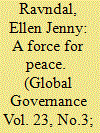

|
|
|
|
|
| Summary/Abstract |
The UN Charter describes him or her merely as the “chief administrative officer of the organization,” yet today the Secretary-General is widely recognized as the UN's chief political representative. How did this transformation and expansion of the office from administrative to political take place? Existing scholarship tends to emphasize the contribution made by Dag Hammarskjöld. This article challenges that story on two accounts: first, by pointing out the importance of institutional factors and not just the officeholder's personality; and second, by examining the contribution made by Trygve Lie, the UN's first Secretary-General. The article establishes a conceptual framework based on institutional theory to understand the role of the Secretary-General and analyzes Lie's contribution in the period 1946–1953.
|
|
|
|
|
|
|
|
|
|
|
|
|
|
|
|
| 2 |
ID:
154710
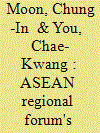

|
|
|
|
|
| Summary/Abstract |
The Association of Southeast Asian Nations Regional Forum has introduced the Experts and Eminent Persons system as a security affairs–related epistemic community in Asia Pacific. However, its performance has remained rather stagnant. This article assesses its performance by examining achievements and limitations of the system and identifies barriers to its effective functioning. The findings attribute its dismal performance to skewed composition and poor quality of membership, lack of depth and diversity of expertise and knowledge, absence of knowledge sharing or diffusion function, and negligible policy impact. The article suggests ways to improve the performance of the ARF-EEPs, and concludes by offering theoretical, empirical, and policy implications.
|
|
|
|
|
|
|
|
|
|
|
|
|
|
|
|
| 3 |
ID:
154717
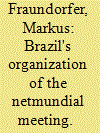

|
|
|
|
|
| Summary/Abstract |
In the face of the apparent weaknesses of the state system to find meaningful solutions to global challenges such as the regulation of the Internet, more democratic forms of governance may show more creative and innovative ways to move forward. Instead of focusing once again on the usual suspects in this debate (civil society actors, Western state actors, or international organizations), this article sheds light on the role of Brazil, a developing democracy from the Global South. The article examines Brazil's organization of the 2014 Global Multistakeholder Meeting on the Future of Internet Governance (NETmundial) in São Paulo. NETmundial allowed governments, civil society organizations, private actors, and local Internet communities to elaborate a human rights declaration on global Internet governance. The article explores why this multistakeholder process was so successful compared to previous multistakeholder approaches in global Internet governance. In the same vein, it argues that Brazil was capable of organizing a multistakeholder meeting based on three particular democratic elements: the promotion of human rights, the creation of participatory mechanisms, and the establishment of accountability mechanisms.
|
|
|
|
|
|
|
|
|
|
|
|
|
|
|
|
| 4 |
ID:
154711
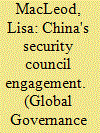

|
|
|
|
|
| Summary/Abstract |
This essay argues that UN Security Council responses to internal armed conflict are the product of the interests as well as the causal and principled beliefs of its engaged permanent members. As China has grown from a regional to a global actor, it has become a more active participant in Council deliberations. The cases of East Timor and Darfur highlight the ways in which Council decisions have come to reflect Chinese understanding of the causes of peace and conflict and appropriate peace strategies. The future of UN peace operations will depend on the ability of the Council's engaged participants to discover shared interests and points of convergence in their causal and principled beliefs.
|
|
|
|
|
|
|
|
|
|
|
|
|
|
|
|
| 5 |
ID:
154716
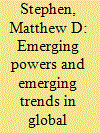

|
|
|
|
|
| Summary/Abstract |
In the 1990s, liberal optimism permeated the study and practice of international politics. International institutions were strengthened and the discourse and practice of global governance consolidated as a new approach to world affairs. Today, new powers are emerging in this institutionalized order. New powers have changed the power relations that underpinned global governance and are also economically, politically, and culturally different from established powers. Against this backdrop, this article investigates the impacts emerging powers are having on global governance. It presents six major trends and outlines their implications for the new global governance currently taking shape. Because new powers are emerging in an already institutionalized order, the emerging global governance order is gradually growing out of the existing one. Emerging powers are rendering parts of global governance dysfunctional, layering onto it, complicating it, but not overthrowing it.
|
|
|
|
|
|
|
|
|
|
|
|
|
|
|
|
| 6 |
ID:
154713


|
|
|
|
|
| Summary/Abstract |
Building on recent discussions of the role of public-private partnerships in governance, this article argues that we must be more critical of the goals set by PPPs, and pay closer attention to the ways in which gender-based inequalities are obscured or overlooked in the construction of global policy strategies. In particular, the Group of 8's New Alliance for Food Security and Nutrition pledges to “act upon the critical role” played by women. Yet this article reveals that the New Alliance partnerships offer little in terms of substantive goals that address the gender inequalities experienced in rural land and labor markets, and instead appear to favor the expansion of trade without reference to the implications for rural food security.
|
|
|
|
|
|
|
|
|
|
|
|
|
|
|
|
| 7 |
ID:
154712


|
|
|
|
|
| Summary/Abstract |
Numerous international organizations play a key role in generating and sustaining migration governance across the world in the absence of a global migration regime. However, global governance scholarship lacks grounded understanding of their role, which is often rejected or simply left unnoticed. In rare cases when IOs do get academic attention, light is shed on two referent “migration” IOs—the International Organization for Migration and the UN High Commissioner for Refugees—while other IOs remain in their shadow. Drawing on the case of the post-Soviet Central Asia, which is characterized by both significant migration dynamics and multilayered governance but has so far escaped attention of migration governance scholars, this article takes two steps for establishing a new research agenda. First, it deploys and applies to IOs the concept of global migration governors defined as authorities who exercise power across borders for the purpose of affecting migration policy. Second, it moves discussion beyond the referent IOs and demonstrates the role of often overlooked nonreferent IOs, such as the World Bank, active in the field of migration governance. This analysis is based on fieldwork in Kazakhstan, Kyrgyzstan, Tajikistan, Uzbekistan, and Russia conducted in 2011–2015.
|
|
|
|
|
|
|
|
|
|
|
|
|
|
|
|
| 8 |
ID:
154708


|
|
|
|
|
| Summary/Abstract |
MANY OF US ARE OFTEN ASKED HOW WE BECAME WHO WE ARE. FOR ME,
that has generally come down to the old adage—nature (genes) or nurture
(parental influence), and the latter is pretty strong in my case. My father,
Norman J. Padelford, was one of the early scholars of international organization
(IO) and the United Nations. He was one of a number of academics
who were recruited by the US Department of State during World War II as
consultants to work on the preparation of the UN and other issues. After
participating in the 1944 Dumbarton Oaks conference and the April 1945
meetings of the UN Committee of Jurists in Washington, DC, he served as
executive officer for Commission IV of the UN San Francisco Conference
Secretariat, which dealt with all arrangements concerning the International
Court of Justice and such other legal matters as were referred to in the draft
Charter. In the closing days of the conference, he was made secretary of the
jurists committee that directed the work of drafting the Charter. In 1946, he
moved from the Fletcher School to MIT to develop courses in international
relations. He was a founding editorial board member and later chairman for
the journal International Organization (1960−1973). He died in 1982
before his friend Gene Lyons and others founded the Academic Council on
the United Nations System (ACUNS) and invited me as a then relatively
junior scholar at the University of Dayton to be part of the ACUNS founding
conference and to give the presentation “Teaching International Organization.”
So, the story of the UN’s founding has always, in part, had a personal
dimension for me, as has much of the history of the study of the UN
and international organizations.
|
|
|
|
|
|
|
|
|
|
|
|
|
|
|
|
| 9 |
ID:
154709


|
|
|
|
|
| Summary/Abstract |
PREVENTION IS INTRINSIC TO THE PREMISE OF THE UNITED NATIONS.
1 UN ACTION
is understood as pursuing the three pillars of “peace and security,” “development,”
and “human rights,” but prevention is central to them all. As the world
faces possibly the gravest set of crises in the UN’s seventy-one-year history,
vital issues regarding the UN role in prevention must be urgently addressed.
|
|
|
|
|
|
|
|
|
|
|
|
|
|
|
|
| 10 |
ID:
154715
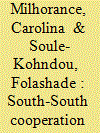

|
|
|
|
|
| Summary/Abstract |
Using the examples of the UN Development Programme and the UN Food and Agriculture Organization, this article aims to analyze how the role of international organizations (IOs) is being changed through the incorporation of South-South cooperation (SSC) narratives and practices into their activities. Despite increased interest in the role of SSC in global governance, few empirical researchers get inside these organizations to see and analyze how this form of cooperation impacts IOs and how the latter adapt to these changes. Based on fieldwork and participant observation, the article presents some results on the mechanisms of IOs in their efforts to permanently readapt to the international environment and, at the same time, participate in the configuration of the international scene. The main argument is that the revival of SSC by rising powers has offered them an opportunity to establish individual and collective strategic partnerships with IOs. In doing so, these powers used SSC modalities to engage several redirections of IOs' governance to lift SSC to the top of the international agenda. IOs first resisted these changes and then readapted by using these strategic partnerships as a means to reaffirm their role in the international system's hierarchy as main institutions promoting SSC.
|
|
|
|
|
|
|
|
|
|
|
|
|
|
|
|
|
|
|
|
|